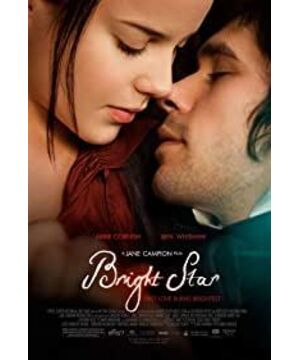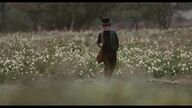2009 The British film "Bright Star" shows the poet's incomparably moving soul with breathtakingly beautiful images and Keats' last love in his life. The 18-year-old rich girl Fanny Brawne's smooth forehead The beautiful eyes with quiet sadness are as mysterious and profound as poetry, and love with the poet is both accidental and inevitable. They have a common beauty. They love each other deeply, and the most profound and complete love will definitely not be able to get rid of the entanglement of the spiritual world. But this love It was so short, in 1821, when Keats died in a foreign land at the age of 25. Fanny did not forget him throughout his life. Until his death, Keats always believed that he had achieved nothing in this life, and he would never know that he is still recognized as the nineteenth century. Britain's most famous romantic poet. Perhaps what he did not expect is that although he once wrote that "the new love will wither before tomorrow", his love with Fanny became their mutual life.
He was young What disease did he die of? Pneumonia? Tuberculosis? The blood he spat out of his mouth stained his white shirt when he fell ill. In fact, his illness was called sadness, and he died of sadness. What made him so sad
? There will never be "Ode to the Nightingale". Without "Ode to the Nightingale", who can understand his boundless contemplation and sadness? What
Keats' melancholy and weak soul can't bear is the hugeness and strength of reality, and poetry is the only one Can bring him strength. In this world, sadness has more powerful and persistent power than happiness.
His epitaph reads: Here lies one whose name was written in water.
He has become an immortal phoenix.
John Keats
My heart aches, and a drowsy numbness pains
My sense, as though of hemlock I had drunk,
Or emptied some dull opiate to the The drains seemed to have just swallowed opium,
One minute past, and Lethe-wards, had sunk; So it sank toward Lethe-wards:
'Tis not through envy of thy happy lot, it's not that I'm jealous of your luck,
But being too happy in thine happiness ---
That thou, light-winged Dryad of the trees,
In some melodious plot Fairy ,
Of beechen green and shadows numberless, You hide in the green and shadows of beech,
Singest of summer in full-throated ease. Let go of your voice and sing of summer.
O, for a draught of vintage! that hath been that refrigerated
Cooled a long age in the deep-delved earth,
Tasting of Flora and the country green,
Dance, and Proven?al song, and sunburnt mirth! Think of flowers God, love song, sunshine and dance!
O for a beaker full of the warm South,
Full of the true, the blushful Hippocrene,
With beaded bubbles winking at the brim,
And purple-strained mouth;
That I might drink, and leave the world unseen,
And with thee fade away into the forest dim; And with thee fade away into the forest dim; Fade
far away, dissolve, and quite forget
What thou among the leaves hast never known,
The weariness, the fever, and the fret Forget the fatigue, the fever, and the restlessness,
Here, where men sit and hear each other groan;
Where palsy shakes a few, sad, last gray hairs,
Where youth grows pale, and specter -thin , and dies; And "paralyzed" has a few grey hairs swaying;
Where but to think is to be full of sorrow Beauty cannot keep her lustrous eyes, and "beauty" cannot keep her lustrous eyes, Or new Love pine at them beyond tomorrow. Away! away! for I will fly to thee, go! Go! I will fly towards you, Not charioted by Bacchus and his pards, But on the viewless wings of Poesy, Though the dull brain perplexes and retards: though the dull brain perplexes and retards: The mind is tired and tired; Already with thee! Tender is the night, go! Oh, I have gone with you!
And haply the Queen Moon is on her throne, the night is so gentle, the moon is on the throne,
Clustered around by all her starry fays;
,
Save what from heaven is with the breezes blown
Through verdurous glooms and winding mossy ways.
I cannot see what flowers are at my feet,
Nor what soft incense hangs upon the boughs;
But, in embalmed darkness, guess each sweet In the warm gloom, I can only guess
what fragrance Wherewith the seasonable month endows
The grass, the thicket, and the fruit tree wild;
White hawthorn, and the pastoral eglantine; The white citrus flower, and the roses of the field,
Fast-fading violets covered up in leaves; this violet of Yixie in the heap of green leaves,
And mid-May's eldest child,
The coming musk rose, full of dewy wine,
The murmurous haunt of flies on summer eves. The buzzing harbour.
Darkling I listen; and, for many a time
I have been half in love with easeful Death,
Called him soft names in many a mused rhyme, I have been half in love with easeful Death Poetry has exhausted good words,
To take into the air my quiet breath; I beg him to take my breath into the void;
Now more than ever seems it rich to die, and now, oh, how rich is death :
To cease upon the midnight with no pain,
While thou art pouring forth thy soul abroad
In such an ecstasy! Send out such ecstasy!
Still wouldst thou sing, and I have ears in vain - You will still sing, but I no longer hear -
To thy high requiem become a sod. Your funeral song can only be sung to a piece of grass.
Thou wast not bonr for death, immortal Bird! Thou wast not bonr for death, immortal Bird!
No hungry generations tread thee down;
The voice I hear this passing night was heard
In ancient days by emperors and clown; The voice I hear this passing night was heard In ancient days by emperors and clown;
Perhaps the selfsame song that found a path
Through the sad heart of Ruth, when, sick for home,
She stood in tears amid the alien corn; Standing in a foreign land thinking of home;
The same that ofttimes hath this voice often
Charmed magic casements, opening on the foam In the lost fairyland, the casement is drawn:
Of perilous seas, in faery lands forlorn. On the sea's treacherous waves.
Forlorn! the very word is like a bell, lost! This sentence is like a bell
To toll me back from thee to my sole self!
Adieu! the fancy cannot cheat so well Farewell! Fantasy, this deceitful elf,
As she is famed to do, deceiving elf.
Adieu! adieu! thy plaintive anthem fades Farewell! do not! Your complaining song
Past the near meadows, over the still stream,
Up the hilside; and now 'tis buried deep
In the next valley glades. Buried in a nearby valley:
Was it a vision, or a waking dream?
Fled is that music --- Do I wake or sleep? Are you awake?
View more about Bright Star reviews











